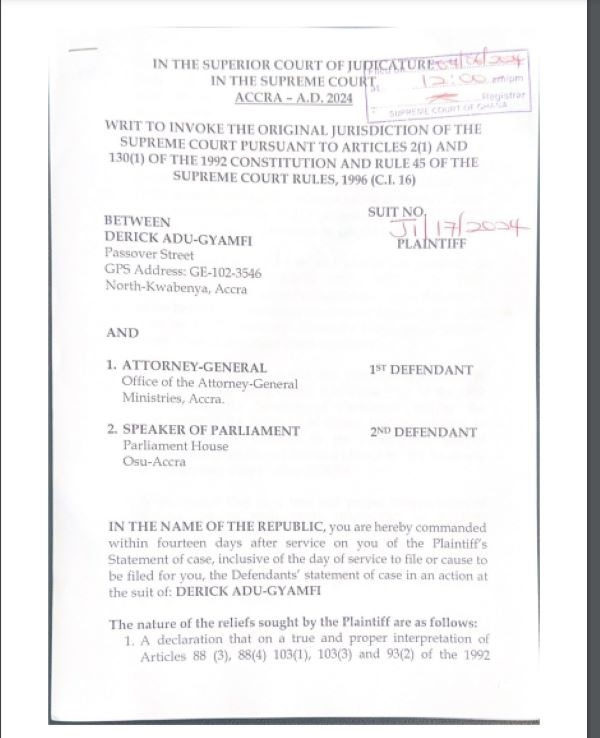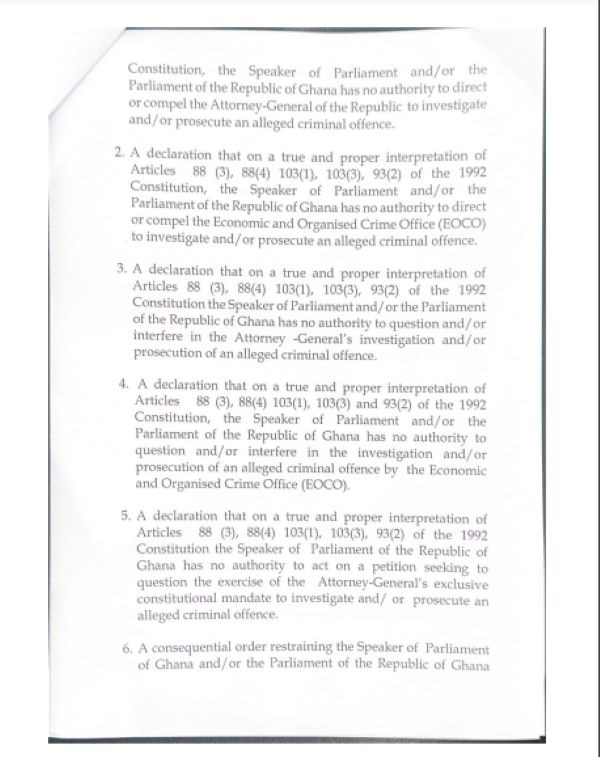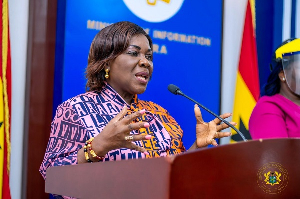A private Ghanaian citizen, Derick Adu-Gyamfi, has filed a writ at the Supreme Court seeking a declaration that “on a true and proper interpretation of Articles 88(3), 88(4), 103(1), 103(3), and 93(2) of the 1992 Constitution, the Speaker of Parliament of the Republic of Ghana has no authority to direct or compel the Attorney General of the Republic to investigate and/or prosecute an alleged criminal offense.”
Relying on the same articles, the plaintiff is praying for the court to also declare that the Speaker of Parliament and/or the Parliament of the Republic of Ghana have no authority to direct or compel the Economic and Organised Crimes Office (EOCO) to investigate and/or prosecute an alleged criminal offence.
As well, he is seeking the apex court to declare that neither the Speaker nor Parliament has the authority to question or interfere with the AG’s investigation and/or prosecution of an alleged criminal offence.
Additionally, the plaintiff is seeking the court to declare that neither the Speaker nor Parliament has the authority to question and/or interfere with the investigation and/or prosecution of an alleged criminal offence by EOCO.
Mr. Adu-Gyamfi also prayed the Supreme Court to declare that the Speaker of Parliament has no authority to act on a petition seeking to question the exercise of the AG’s exclusive constitutional mandate to investigate and/or prosecute an alleged criminal offence.
In mid-May this year, some prominent Ghanaians, including former Auditor-General Daniel Yaw Domelevo, filed a petition to Parliament seeking a bipartisan probe into the conduct of EOCO in the investigation regarding the stash of money found at the residence of former Sanitation Minister Cecilia Dapaah.
The group, which has outspoken anti-graft campaigner Martin Kpebu, security analyst Dr. Adam Bonaa, academician Professor Ransford Gyampo, and over 83 other Ghanaians spanning different walks of life, argues in their petition that EOCO had more than enough basis to investigate the former minister for money laundering as she has been inconsistent and unable to provide the source of the huge amount of money seized at her residence by the Special Prosecutor.
“The failure to explain the source of the money should have been the cornerstone of the investigation,” the petition that was submitted to Parliament on Thursday, May 16, 2024, noted, among others.
It also raised concerns about what the group described as the deliberate refusal by EOCO to take steps to protect the money that had been seized from the residence of the former minister by the OSP.
“Upon receipt of the docket, EOCO did not act timeously to seize the money that the OSP was returning to Cecilia Dapaah, as publicly stated by the OSP.”
The petition also said EOCO has been inconsistent with their public commentary and actions in the investigation.
The development comes in the wake of the standoff between state anti-corruption agencies investigating the former minister over the stash of money.
The OSP is on record to have stated that EOCO lacked the appetite to probe the matter despite the detailed information it shared with them.
The office of the Attorney General advised EOCO against probing Ms. Dapaah for money laundering, insisting there was no basis for it.
The AG’s decision came after the Attorney General's office determined that the Special Prosecutor's request for such investigations lacked a solid basis.
Despite the Special Prosecutor's initial inquiry, which uncovered over 1 million dollars and other suspicious findings at Ms. Dapaah's residence, subsequent analysis by the Attorney General's office revealed no concrete evidence of corruption or related offences.
The absence of criminal implications associated with Ms. Dapaah's assets led the Attorney General's office to conclude that there was no justification for money laundering investigations.
Additionally, the Special Prosecutor directed the Ghana Police Service to probe the source of the funds discovered at Dapaah's home.
The AG advised that while EOCO retains the authority to initiate its own investigation, the Attorney General's office said it was "not necessary," citing the lack of substantive grounds.
"In the absence of the identification of any criminality associated with the properties retrieved from the suspects, the OSP's referral to EOCO for investigations to be conducted into money laundering is without basis," the Attorney General's office advised.


General News of Thursday, 6 June 2024
Source: classfmonline.com

















